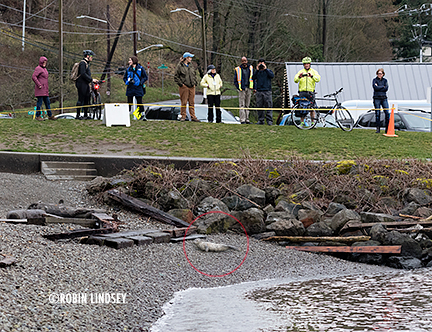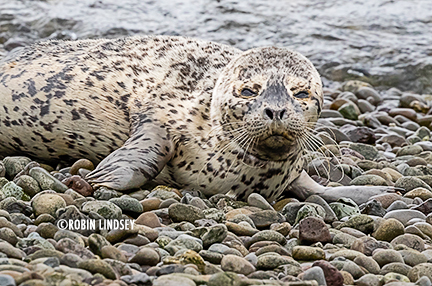Tough times for seal pups and the volunteers who protect them
Mar/17/17 07:31 PM
 Seal Sitters’ hotline received several calls early Tuesday morning about a seal pup onshore at the small cove just south of the West Seattle water taxi landing.
Seal Sitters’ hotline received several calls early Tuesday morning about a seal pup onshore at the small cove just south of the West Seattle water taxi landing. In a heavy rain, First Responders Robin and Nina established a perimeter to give the pup some space despite being about 20 feet from a very busy sidewalk. Commuters, rushing to catch the ferry or by bicycle to downtown, slowed down to admire the small, light-colored pup and read the informational signs on sandwich boards and stakes.

It is not unusual at all for pups to rest 12 hours or more onshore. Like many of the weaned seal pups Seal Sitters looks over during winter months, Granite was too thin. We didn’t realize quite how thin and dehydrated he truly was until late in the day, when he moved down to the water’s edge, allowing us to better evaluate his body condition. Granite was also increasingly lethargic.
Due to the late hour and early evening closure of PAWS Wildlife Center in Lynnwood, it was determined that a rescue would take place the following morning, knowing full well that euthanasia might be necessary. Capture and handling causes tremendous stress to a wild animal and that in itself can sometimes be the tipping point between life and death. It is not taken lightly. Granite did not seem to be suffering and there was no coughing or discharge from the nose or mouth, signs of respiratory disorders. There were no visible wounds. It was our fervent hope that the pup would return to Elliott Bay for at least several hours, foraging on squid or small fish to gain strength and hydrate.
Granite went back into the bay about 7:45 pm, but returned shortly after to the same spot on the beach where, to our knowledge, he spent the remainder of the night. Volunteers were disheartened that he had returned without nourishment.
At 6:30 am the following morning, Robin checked the beach in the rain and dark. It was empty. Sadly, she could see Granite’s body submerged offshore, just out of reach in waters too deep for wading. Within minutes, the tiny body disappeared as the tide receded, swept out into the black waves. The pup had died overnight.
First Responder Lynn arrived with a net and volunteer John helped in the search, but there was no sign of the pup. By odd coincidence, Seal Sitters volunteer and dive instructor Richard Anderson happened to appear with a colleague for a dive in the popular cove. They retrieved the pup, who was placed on the pebbled beach, given a quick exam and transferred into a cooler. Just before pulling out of the parking lot to make the drive to Lakewood for necropsy, Robin watched a woman with her dog traverse the cove, across that same spot where the weak and vulnerable pup had lain.

A seal pup’s condition can take a sudden and tragic turn for the worse - in a matter of days. Up to 50% of harbor seal pups will not survive the first year of life. Contributing factors to pup mortality are: conditions associated with fetal development or premature birth, disease, predation by shoreline predators or domestic dogs, infection, dehydration or starvation.
Thanks to the volunteers and public who ensured Granite some dignity at his last haul-out, free from disturbance or harm. It is very sad for all involved, but there is small comfort in knowing that the beautiful, intricately spotted pup died in peace on his little chosen beach.







